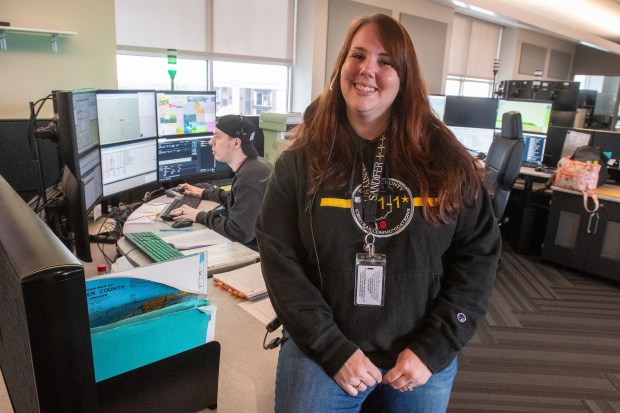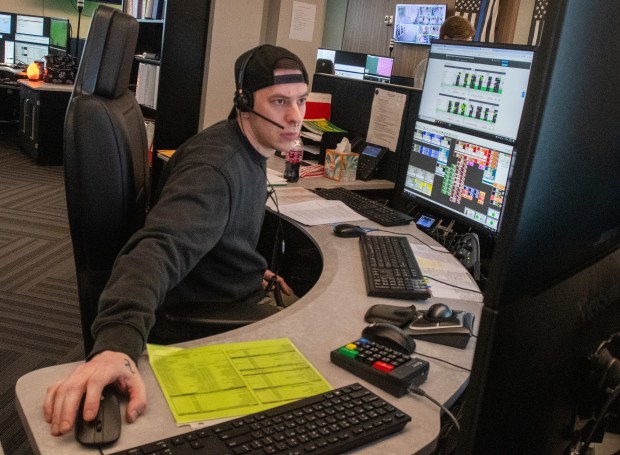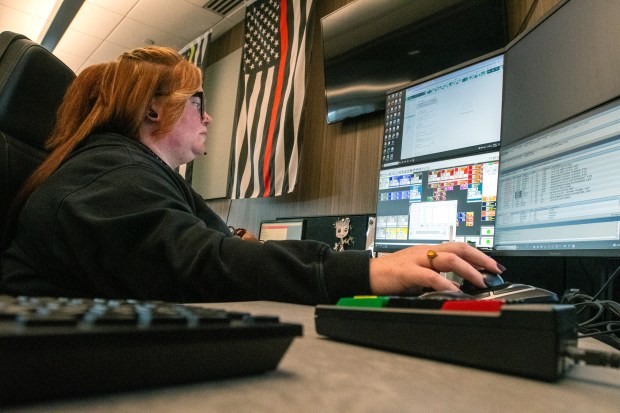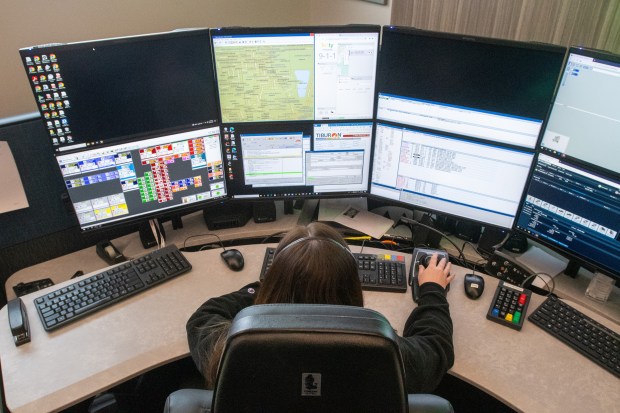The soft gray light pouring into the windows of their upper floor control room, coupled with the calm, low voices of Porter County’s E911 dispatchers, belies the urgency of the accidents and medical emergencies the first class telecommunicators field on a recent rainy Friday afternoon before this, National Public Safety Telecommunicators Week.
Each of the seven finishing out the end of a 12-hour shift works off eight monitors keeping track of maps and the corresponding police, fire, and EMS staff responding to the calls the telecommunicators dispatch them to. While the public has always referred to those civil servants out in the field as first responders, their counterparts fielding the calls for help have only recently received that recognition.
The Indiana House and Senate passed the bill expanding the definition of first responder to include telecommunicators in January and February of 2020. Last month Porter County recognized its Central Communications staff as first responders.
There is even an effort in Congress to pass a bill that would wave the need for first responders to hold private mortgage insurance when buying a home, a benefit extended to veterans.
The Lowell Post of the Indiana State Police put out a statement Monday honoring their colleagues. “Telecommunicators play a crucial role in emergency response, providing critical assistance during times of distress and uncertainty. They are the calm voice on the other end of the line, guiding callers through emergencies and dispatching the necessary resources to the scene,” it read.
Acknowledgment as first responders may be sprouting but telecommunicators are still waiting for more tangible forms of compensation to grow.
“A lot of the benefits that they have, we don’t get,” said E911 Supervisor Jessica Sandifer of her fellow county employees in policing.
“Right now we don’t get time-and-a-half for holidays. A lot of people here have second jobs because you’ve got to live,” she added. “A lot of us are here for the job. We just love to do it.”
That said, turnover is still quite high. After receiving thorough training through the county, telecommunicators often leave for less stressful six-figure jobs dispatching for NIPSCO, the steel mills, and railroads.
There are currently 18 openings, nearly half the full capacity of the department that dispatches police, fire, and medics for all of Porter County except the police dispatch of the towns of Chesterton and Porter.

Since all trainees receive one-on-one training it’s challenging to train very many new telecommunicators at once. Billy Gilland is currently six months into his training. “We don’t have a set training,” Sandifer explained. “We try to go at their pace.”
Training has three phases covering call taking, fire and EMS, and police. Using a keyboard fast enough has been a challenge for Gilland “even though I thought I’d be good at it since I’m good at video games,” he said. “I was born handicapped, so being boots on the ground wasn’t really an option for me.”
Across the aisle, First Class Telecommunicator Hannah Myers takes a medical call. “Is she breathing normally? Is she bleeding or vomiting blood? Does she have any pain?” she asks the caller.

After getting her questions answered she puts the caller on hold and dispatches medics. “Sick person. Patient having difficulty walking,” are some of the facts she relays.
Then it’s back to the caller with some parting instructions. “For now, don’t let her have anything to eat or drink,” she said. “Set out a list of medications and unlock the door.”
While Myers engages in all this talk, a post with red, yellow, and green lights periodically flashes the various colors: red when the call comes in, green when she’s on the phone, and yellow when the responder is talking back to Myers.

There are also a variety of sounds peppering the air. A pretty chime for non-emergency calls and one that Myers says sounds like the “Liberty, Liberty, Liberty” jingle for 911 calls. “Those get prioritized in our system,” she said. “I think we all try to keep it within a three-second answering time.”
Madison Linzy just celebrated her first anniversary as a first class telecommunicator. She came to Porter County from a job as a correctional officer at the Westville Correctional Facility. “I wanted to come back here just because I’ve lived in Porter County my whole life,” she said of her reason for taking the job. “It actually pushes you knowledge-wise. It’s not just mindless.”
While it may be a thinking person’s job, it also takes someone who’s comfortable letting go. “You take the call and you dispatch ‘em out and you never get the end story,” Sandifer said.

Her trainee Gilland has already mastered that part of the job. “There are definitely going to be some calls that you feel attached to, that you want to hear the end,” he said. “I like to know things because I like to know, but I don’t have to know.”
The theme of this year’s National Public Safety Telecommunicators Week is “Dedicated, Strong, Essential.”
Shelley Jones is a freelance reporter for the Post-Tribune.





